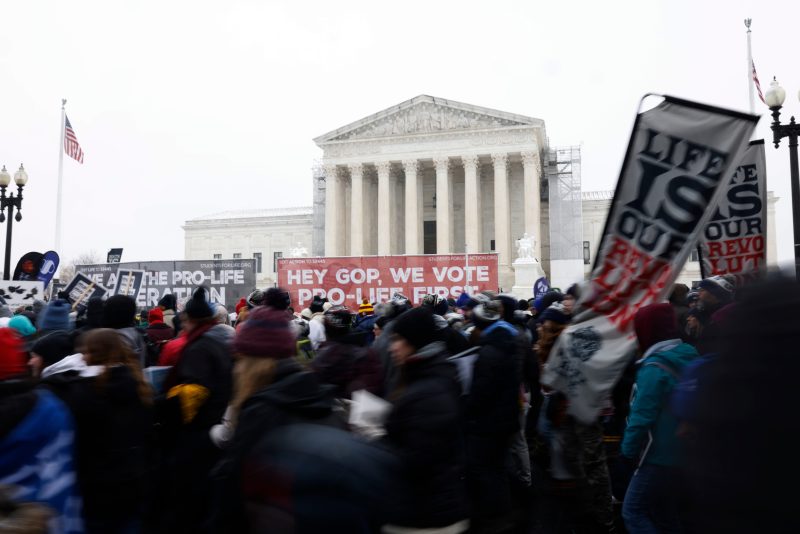Croatia’s President Milanović wins another term after defeating ruling party candidate in runoff
Arizona’s abortion ban is a distinct danger for GOP


Welcome to The Campaign Moment, your guide to the biggest developments in a 2024 election that appears increasingly likely to be about abortion rights.
(Did a friend forward this to you? If so, sign up here. You can also hear my analysis weekly on Apple Podcasts, Spotify, or wherever you get your podcasts.)
In September 2021, the U.S. Supreme Court appeared to open the door to overturning the constitutional right to abortion granted by Roe v. Wade, which it ultimately did a year later.
But Republicans, for some reason, didn’t celebrate much. I reflected at the time on whether they were becoming the proverbial dog that catches the car — achieving a goal they had long sought (being able to severely restrict abortion) and having no idea how to handle it politically.
This past week is the moment they not only caught the car, but arguably had it back over them, courtesy of two state supreme courts.
And the issue appears likely to reverberate well beyond the borders of those two states.
To recap: The Florida Supreme Court last week greenlighted a six-week abortion ban championed by Republicans. Then the Arizona Supreme Court on Tuesday revived a significantly harsher 1864 abortion ban. That law not only serves as a near-total ban, even in cases of rape and incest — it also makes providing an abortion punishable by two to five years in prison.
The developments have been met with a GOP stampede away from the party’s professed principle that abortion is murder. Donald Trump continued punting Wednesday on taking a real position on abortion. And, perhaps most vividly, Arizona Senate candidate Kari Lake has reversed her support for the 1864 law and called for the state’s leaders to do something about it.
Those reactions epitomize just how scared the Republican Party is now of abortion policy — and for good reasons. Among them :
These laws are very unpopular
Polls show north of 60 percent of Americans oppose banning abortion at six weeks of pregnancy. North of 80 percent oppose banning abortion without exceptions for rape and incest. And about three-quarters oppose making it a felony to perform an abortion.
These specific states are important
Where this is happening shouldn’t be lost on anyone, because it could matter greatly in the 2024 presidential race. These are the harshest bans to date in competitive states.
Florida went for Trump by about one point in 2016 and by about three points in 2020. Arizona went for Biden by 0.3 percent in 2020 and was the tipping-point state for his victory.
Both states, very notably, are also likely to be among those featuring November ballot measures in which voters can effectively reverse these laws. Given that even red states have unfailingly voted in favor of abortion rights in recent years, that could allow Democrats to drive turnout and flip voters who view the GOP as too extreme on this issue.
Some wagered that a similar GOP effort to put gay-marriage bans on states’ ballot in 2004 helped reelect George W. Bush. The evidence is mixed on that. But in that case, voters weren’t reversing anything, and few things are as politically potent as the perception that due rights are being taken away.
The electoral math
Florida would seem less likely to flip for Biden, given that the state has trended red in recent years and Gov. Ron DeSantis (R) won reelection by 19 points in 2022. But if its 30 electoral votes somehow went blue, Biden would almost certainly win reelection.
Arizona and its 11 electoral votes are more pivotal. Biden’s campaign has eyed a Midwestern firewall of holding Michigan, Pennsylvania and Wisconsin. Winning Arizona would probably mean it needs only two of those three.
But it’s bigger than Arizona and Florida
In some ways, focusing on specific states misses the bigger point. That bigger point is that these developments re-inject a major issue that clearly favors Democrats — and increasingly bedevils Republicans — into the national campaign.
There has been some question about whether abortion rights would remain as politically resonant as they were in 2022; it’s why Democrats have pushed for abortion ballot measures in states across the country.
Democrats now have something much more politically potent: multiple concrete cases-in-point that allow them to really press the issue. They can point out that the fruits of Trump’s and Republicans’ efforts to overturn Roe are very unpopular laws not just in deep-red states, but in big, competitive states. They can note that this has led to in vitro fertilization being paused in Alabama, after another state supreme court ruling.
Meanwhile, these situations have laid bare real discord in the GOP that is likely to fester. Antiabortion true-believers are balking at Trump’s new hands-off position on abortion, which appears increasingly untenable. Arizona GOP lawmakers are faced with whether to do something about the 1864 law — and effectively legalize abortion — in ways that could also alienate those true-believers.
There are no easy answers, and plenty of unintended consequences. And Republicans have the new abortion-rights paradigm they spent decades pushing for to thank for that.
64 percent
That’s the percentage of voters who view the Manhattan hush money charges against Trump as at least “somewhat serious,” according to a Reuters-Ipsos poll conducted on the eve of his first criminal trial Monday.
That number appears to have risen from last year, when between 50 percent and 55 percent of voters described the charges in those terms, including in Ipsos polling. And it’s not the only recent poll to show that number is higher; in an Economist-YouGov poll last month, nearly two-thirds described the situation as at least “somewhat serious.”
The newer Ipsos poll also shows about 4 in 10 Republicans regard the charges as at least “somewhat serious” — significantly higher than in polling last year.
But despite the apparent increase in concern about the gravity of the charges, the percentage who view the situation as “very serious” is still significantly lower than in Trump’s three other cases. The YouGov poll pegged that number at 33 percent, compared with around half for the other cases.
“Trump’s Cabinet was in flux. Biden’s has barely changed.” (Washington Post)“Why Trump’s ‘hush money’ case is bigger than hush money” (Washington Post)“Republicans close gap with Democrats on party identification, Pew survey finds” (Washington Post)“The increasingly authoritarian-curious Republican Party” (Washington Post)“Trump Allies Have a Plan to Hurt Biden’s Chances: Elevate Outsider Candidates” (New York Times)“Biden is building a behemoth of a campaign. Trump at this point seems to be playing catch-up.” (NBC News)“Young voters aren’t warming up to Biden. They know it means Trump could win again.” (USA Today)











